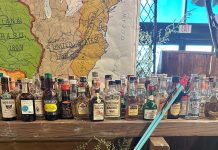Minnesota-based startup Oliver Cabell first made waves when it debuted in 2016 with a collection of sleek, high-quality leather and canvas bags, priced at a fraction of the cost of goods of similar quality from luxury competitors on the market. The direct-to-consumer brand was built on the idea that high-quality, well-designed goods shouldn’t have to cost a fortune—and detailed its entire chain of production on its website to provide greater transparency in its pricing and production methods.
Now, the socially conscious brand has moved into a new market: footwear. Last fall, it announced it had secured $1.2 million in financing from an undisclosed angel investor to get into the shoe business—a move that made waves everywhere from WWD and Fashionista to the New York Post and TechCrunch. That unisex line launches today with its first two styles, a modern trainer and a low-cut plimsoll, each available in four neutral shades. From there, the brand will implement a “drop of the week” model, releasing one new, luxe sneaker style every week, priced up to $220.
While a weekly-release business model sounds ambitious, Oliver Cabell’s chief executive and founder Scott Gabrielson says that new manufacturing capabilities makes it feasible. Most shoe manufacturers work with brands that have seasonal shoe releases, which leads to swings in production demand and slower times for manufacturers between seasons, he explains. By cutting out the middleman (i.e., traditional retailers), the brand can keep costs down and pass the savings along to the customer.
The brand’s expansion into footwear happened unintentionally, says Gabrielson. Oliver Cabell produces all its accessories in the Marche region of Italy, which happens to be a mecca for luxury shoes. “We came across a set of old, dusty sneaker molds in our factory, and I thought it was a real treasure and that we could make something really unique with them,” he says. “We decided to make a pair with the molds, and after 22 samples we ended up with our first sneaker.”
The shoes are handcrafted using high-end materials, such as full grain leather from the Veneto region of Italy (the same tannery that supplies Prada and Saint Laurent) and outsoles from the iconic Italian suppliers Margom and Dami. “Our approach is pretty simple: to offer handcrafted sneakers using old school shoemaking and the finest materials, and then reveal it all, from factories to costs,” says Gabrielson. “Ninety percent of our shoes are made with cobblers using simple tools. We then marry it with the latest technology.”

The Rennes Trainer in Nude
The Oliver Cabell partners with suppliers on a long-term basis, which allows them to purchase lower quantities, gain first access to unique materials, and have more flexibility with payment terms. Each limited-edition shoe will come in runs of 50 to 150 pairs each, though some of the more popular styles may be restocked. The faster pace of production also lets the company get more creative with silhouettes and materials.
“We’re able to do smaller unit runs because we partially own our factory in Europe,” Gabrielson says. ‘That way we can keep things more fresh and interesting.”
Gabrielson was inspired to create Oliver Cabell following the 2013 collapse of a Bangladeshi garment factory that killed more than 1,000 workers, which exposed the widespread unethical treatment and unsafe working conditions faced by overseas workers and the lack of transparency in the apparel and accessories manufacturing industry. While visiting a factory in Asia, he witnessed cramped female workers, earning $7 a day, gluing and sewing designer bags and accessories. He says one of the bags, which the brand claimed to only produce in Italy, cost under $100 to make, and sold for over $1,200.
While the majority of luxury goods, such as handbags and footwear, on the market are marked up by as much as 20 times what they cost to make, Oliver Cabell’s products are priced to reflect the actual costs involved in making them. In addition to being transparent with regards to pricing—itemizing the cost of materials, labor, transit, and duties involved in making each bag—Oliver Cabell’s website spotlights the mills, tanneries, and factories that manufacture the brands goods, letting consumers know exactly where their dollars are going.
Shop the first release of the Oliver Cabell footwear line exclusively at olivercabell.com.

The Low 1 in Nude

The Low 1 in Alloy

The Low 1 in White

The Low 1 in Black

The Rennes Trainer in Alloy

The Rennes Trainer in Nude

The Rennes Trainer in Black

The Rennes Trainer in White







